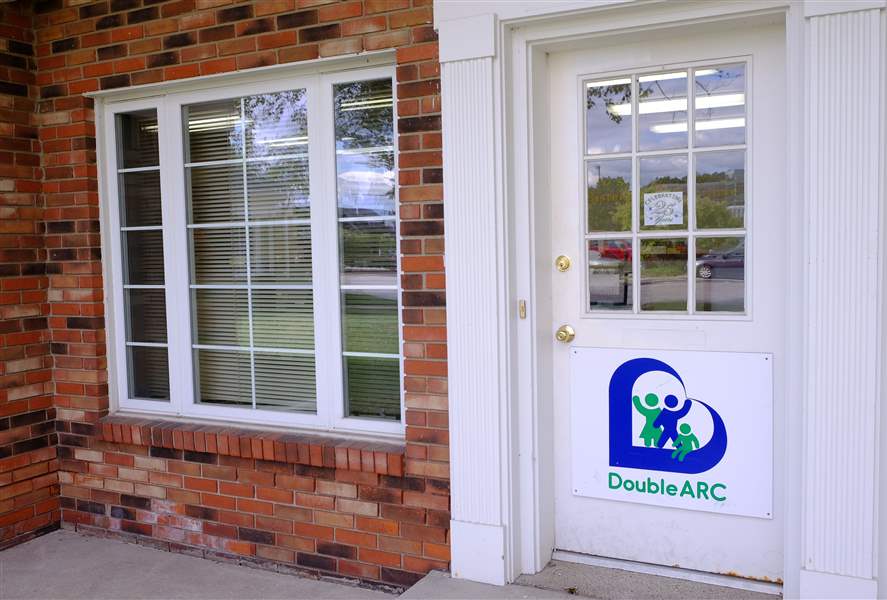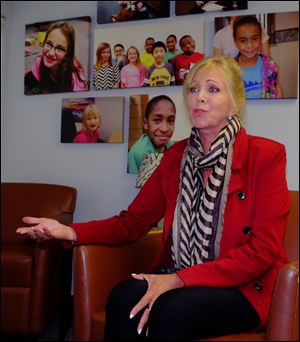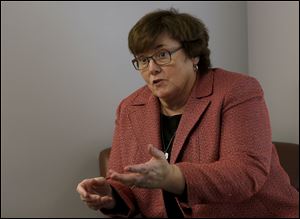
Sounding the alarm on prenatal alcohol exposure
11/6/2017
Double ARC in Sylvania is marking 25 years of serving families affected by fetal alcohol spectrum disorders in the region.
THE BLADE/LORI KING
Buy This Image

Kathy Mitchell talks about her past experience and future activism with Fetal Alcohol Syndrome during an interview at Double Arc in Sylvania.
When Kathy Mitchell was starting her family in the early 1970s, conversations about prenatal health went differently than they do today. In the era of sex, drugs, and rock ’n’ roll, she recalled, no doctor or well-meaning family member ever thought to warn the young mother against the dangers of drinking alcohol while pregnant.
And why would they? No one had yet connected the slate of physical, intellectual, and behavioral symptoms that were manifesting in some children to the drinks their mothers had unwittingly enjoyed before they were ever born.
“The information about fetal alcohol syndrome hadn’t even been written,” said Ms. Mitchell, who was already a mother of two by the time researchers coined the term in 1973.
Conversations about fetal alcohol spectrum disorders have come a long way in the years since Ms. Mitchell gave birth to her second child, Karli Schrider, and, years later, learned that the developmental delays her then-teenage daughter had been displaying since infancy were actually the result of fetal alcohol syndrome.
Today Ms. Mitchell compares her baby doll-loving 44-year-old daughter, developmentally, at least, to a 6-year-old; Ms. Schrider recently moved into a group home where her mother said she has the sort of support she always had — and always will — need.
In channeling her experience into advocacy, Ms. Mitchell, who is vice president and international spokesman for the National Organization on Fetal Alcohol Syndrome, has been a part of that conversational shift toward awareness and education. So, too, has a local nonprofit, Double ARC, that welcomed Ms. Mitchell as a keynote speaker at a recent fund-raising breakfast.
Double ARC this year marks 25 years of serving families who are affected by fetal alcohol spectrum disorders in the community. It was started in 1992 by the Sisters of Notre Dame, who sought to identify and address the learning and behavioral problems they were seeing in their classrooms, and today continues its work of advocacy, education, and support.
“Our Double ARC history mirrors what Kathy went through,” said Executive Director Janet Bosserman, pointing to parallels between the sort of questions that Ms. Mitchell was asking about young Karli to the sort of questions the nuns were asking about their students. “The sisters set out to try to find out about these kids, like (Ms. Mitchell’s) daughter, but in Toledo, Ohio.”
Sister Suzette Fisher has been with the nonprofit since her order founded it. The director of client services recalled that the sisters were noticing issues like those Ms. Mitchell described. A child who might be able to recite her ABCs perfectly one day seemed to completely forget them the next. They just weren’t sure how to explain them.

Double ARC in Sylvania is marking 25 years of serving families affected by fetal alcohol spectrum disorders in the region.
A crack epidemic was dominating conversations in the early 1990s, Sister Suzette recalled, so, initially, the sisters wondered if that could be a factor. A year had barely passed before they came across a speaker who turned them onto a culprit that they learned was significantly more damaging to developing brains: alcohol.
As many as one in 20 children may have a fetal alcohol spectrum disorder, an umbrella term for lifelong symptoms that range from mild to severe, according to data cited by Double ARC and by the National Organization on Fetal Alcohol Syndrome. These can manifest in a wide variety of intellectual, behavioral, and even physical ways, including poor memory, hyperactive behavior, learning disabilities, low IQs, difficulty with attention, and poor reasoning of judgment skills.
The realization shifted the focus of Double ARC early on, and, since then, it has provided wraparound support specifically for families affected by fetal alcohol spectrum disorders. Staff and volunteers reach out to parents, educators, social service providers, and more through support groups, educational seminars, and individual case management.
They’ve also diagnosed more than 275 cases of fetal alcohol syndrome locally. Diagnosis is an important step, Sister Suzette said, because it can connect a family with the appropriate resources in schools or in the community as well as help those who interact with these children to understand behaviors that, on their surface, can prove frustrating.
“So many parents call and say, ‘I’m at my wit’s end. I don’t know where to turn,’” Sister Suzette said. “Many of them say they came to Double ARC and [the staff] ‘understood what I was going through and they understood my child.’”
The work of raising awareness, too, remains important, even more than 40 years after researchers first rang alarm bells regarding fetal alcohol spectrum disorders. The Centers for Disease Control and Prevention reports that 1 in 10 pregnant women reported consuming any alcohol within 30 days of polling completed in 2013; one in 33 reported binge drinking in the same period.

Janet Bosserman, executive director at Double Arc in Sylvania, talks about Fetal Alcohol Syndrome.
There’s also the issue of women who drink without knowing that they are pregnant: The CDC also reports that about half of U.S. pregnancies are unplanned and that women can go four to six weeks before even learning about the baby.
While Ms. Mitchell said she doesn’t see much debate any more about the dangers of binge drinking while pregnant, she said there’s still work to be done on clarifying the dangers of moderate drinking. Double ARC stands with CDC, American Academy of Pediatrics, American Congress of Obstetricians and Gynecologists, National Institutes of Health, and the U.S. Surgeon General in asserting that there is no safe amount of alcohol to consume while pregnant.
“I think all the other drug issues are kind of masking the alcohol piece. Alcohol is a legal drug, so people don’t think about it,” Sister Suzette said. “I remember at least one woman who stopped [taking drugs] when she realized she was pregnant. She had no idea alcohol was more damaging.”
Ms. Mitchell regularly hears from women who worry that a condition affecting a child could have been caused by alcohol consumption during pregnancy, even, in at least one case, a panicked woman who wondered if a single glass of wine could have led to a diagnosis that research has not linked to fetal alcohol exposure.
Ms. Mitchell is familiar with the feeling: She said she still wonders and worries whether her other children, who have not been diagnosed with fetal alcohol syndrome, might have been affected nonetheless by her unwitting decision to drink while pregnant.
“That’s where the no-alcohol message is the right message for everyone,” she said, “because it can be really hard to be a mother. You don’t want them to ever go through that.”
Contact Nicki Gorny at ngorny@theblade.com or 419-724-6133.